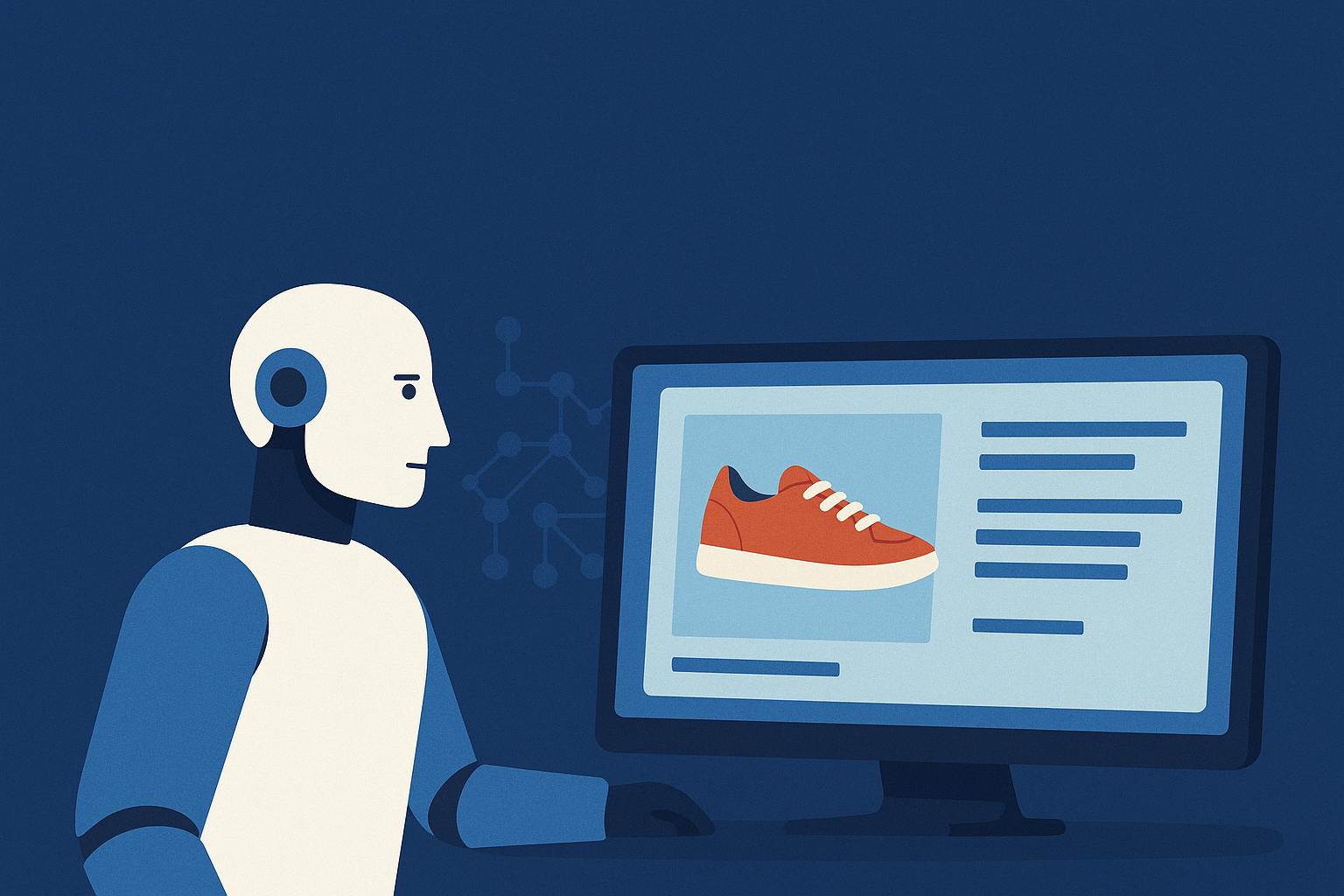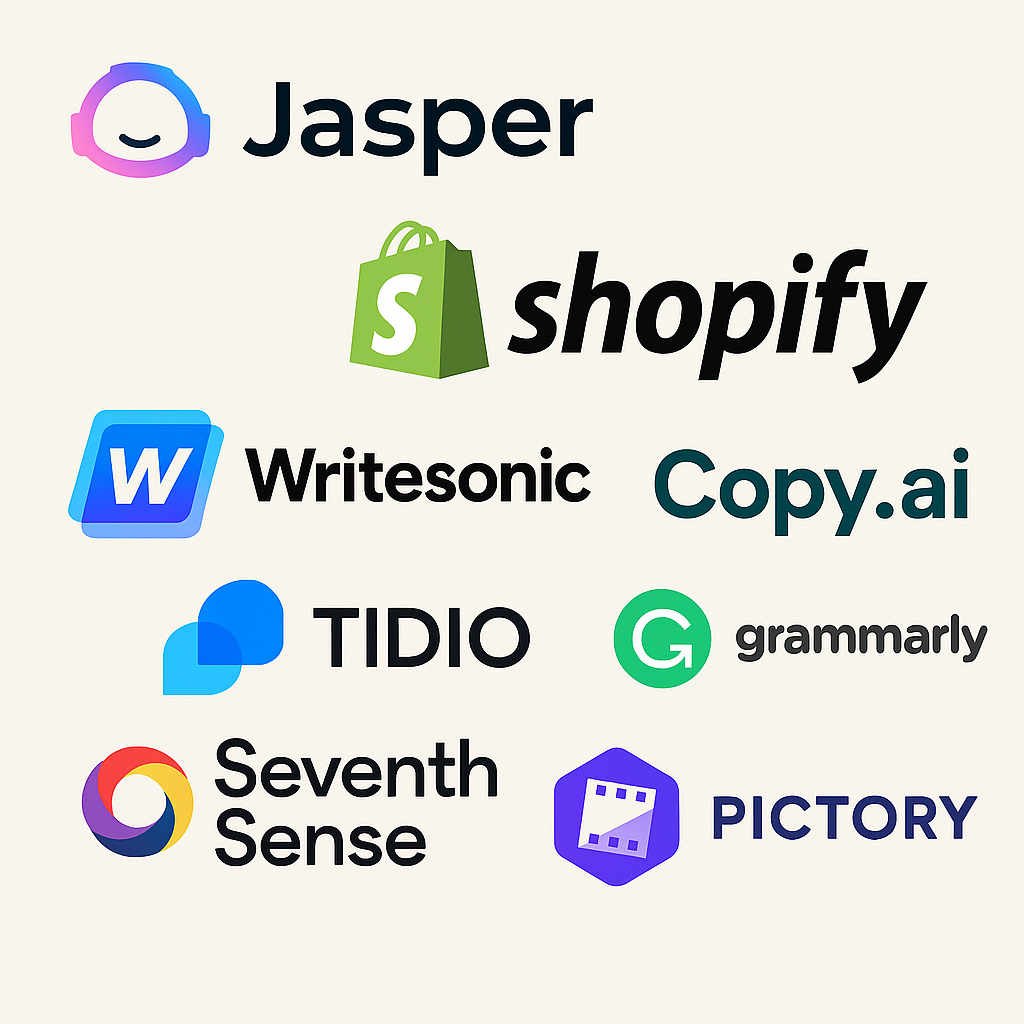Physical Address
304 North Cardinal St.
Dorchester Center, MA 02124
Physical Address
304 North Cardinal St.
Dorchester Center, MA 02124

Last year, Sarah launched her first online store selling handmade skincare products. Despite her passion and quality items, sales were slow. She spent hours writing product descriptions and tweaking her website, but nothing seemed to work—until she discovered AI-powered product content.
By using AI tools to write clear, personalized, and SEO-friendly product descriptions, Sarah saw her traffic grow and conversions improve. Within months, her store was ranking higher on search engines, and customers started buying more.
Stories like Sarah’s are becoming common in 2025. As online competition grows, brands are turning to smart technology to boost e-commerce sales with AI. AI isn’t just a trend—it’s changing how businesses create content, connect with customers, and increase revenue.
In this blog, we’ll explore how AI-powered product content helps you stand out in the crowded e-commerce market. From product page optimization to e-commerce SEO with AI, we’ll break down everything you need to know to succeed in 2025—no tech jargon, just practical tips.
AI-powered product content means using artificial intelligence tools to create product descriptions, titles, meta tags, and more—quickly and effectively. Instead of spending hours writing text for each item, online store owners can now let smart tools do the heavy lifting.
These tools are trained to understand your products and generate content that speaks directly to your customers. For example, if you sell shoes, AI can write detailed descriptions that highlight comfort, style, and size options—all while using keywords that help people find your products on Google.
This kind of content is not only clear and helpful but also SEO-friendly. That means it helps your store appear in search engine results when customers search for products like yours. With AI-powered product content, you get descriptions that are written to sell and optimized to rank.
Many tools also adjust the tone and language to match your brand, making your store feel more personal and professional. Whether it’s a catchy product title or a well-written meta description, AI helps you save time and improve results.
In short, AI-powered product content is a smart, simple way to create content that boosts visibility, builds trust, and encourages more sales.

In 2025, running a successful online store means more than just having great products. It’s about smart decisions, fast action, and keeping customers happy—and that’s where AI makes a big difference.
Today’s shoppers expect a smooth, personal experience. With the help of AI tools, online businesses can track customer behavior, understand what people like, and show the right products at the right time. This kind of personalization keeps customers engaged and coming back.
AI also saves time by automating tasks like writing product descriptions, updating inventory, and even replying to common customer questions. Instead of doing everything manually, store owners can focus on growth while AI handles the rest.
One of the biggest benefits is how AI helps improve online sales with AI tools. From smarter pricing to better recommendations, AI uses real data to make decisions that boost revenue. It’s like having a digital assistant that works 24/7 to make your store better.
As competition grows in e-commerce, using AI isn’t just helpful—it’s essential. It gives businesses the edge they need to grow faster, connect with more customers, and turn visits into sales. AI tools are now a key part of smart e-commerce strategies.
AI is transforming the way online businesses grow. From personalized product listings to better SEO strategies, it offers powerful ways to boost e-commerce sales with AI. Below are five key areas where AI makes a big difference in 2025.
Creating product descriptions, titles, and meta tags for hundreds of items can be overwhelming. With AI-powered product content, you can generate clear, keyword-rich text in seconds. This speeds up your workflow and improves content quality.
AI also helps personalize product listings for each shopper. It uses customer data to show relevant items, making the shopping experience feel more tailored—and increasing the chance of a sale.
A well-designed product page leads to better results. AI helps with product page optimization by adjusting layout, improving image quality, and writing detailed descriptions that connect with your target audience.
It also supports A/B testing by showing different versions of your product pages and measuring what works best. AI can even create dynamic content that changes based on user behavior, making each visit more engaging.
Ranking high in search results brings more visitors to your site. With e-commerce SEO with AI, you can discover the best keywords, write optimized metadata, and organize content into clusters that search engines love.
AI tools also improve click-through rates by crafting titles and snippets that are clear, attractive, and relevant to search intent. This means more visibility—and more potential customers.
AI can help turn visitors into buyers through smart recommendations. By tracking browsing behavior and past purchases, AI suggests the right products at the right time. These personalized suggestions increase trust and encourage faster decisions, which leads to better conversion rates.
You can also use AI-driven upselling and cross-selling strategies to boost the average order value—making each visit more profitable.
As your store grows, so does the amount of content you need to manage. AI makes it easy to scale without losing quality. Whether you’re adding hundreds of new products or expanding to new markets, AI ensures your content stays consistent, optimized, and easy to manage.
This scalability allows small and mid-sized businesses to compete with larger brands—without needing a massive content team.
In 2025, AI tools are essential for e-commerce businesses aiming to enhance efficiency, personalize customer experiences, and drive sales. By leveraging AI-powered solutions, online retailers can streamline content creation, optimize product recommendations, and provide real-time customer support. Here’s a look at some leading AI tools that can help improve online sales.

Creating engaging product descriptions and marketing content is key to converting browsers into buyers. Fortunately, AI-powered content tools help you produce optimized content at scale, saving time and resources.
Writesonic: Writesonic offers tools for writing SEO-rich product descriptions, blog articles, and landing page content. It’s great for businesses that want to drive traffic and boost conversions through content marketing.
Jasper: Jasper is an AI content assistant built for marketers. It generates product descriptions, ads, and blog posts that match your brand tone. Jasper is ideal for speeding up campaign creation and avoiding creative bottlenecks.
Copy.ai: If you need quick, persuasive product content, Copy.ai is a great choice. Simply input your product details, and it will deliver optimized, high-converting copy in seconds.
Smart product suggestions increase customer engagement and average order value. AI recommendation engines analyze shopping behavior to recommend the right products at the right time.
Dynamic Yield: Dynamic Yield personalizes shopping experiences across all platforms—online and offline. Its AI system helps you drive more conversions through relevant product displays and offers.
Coveo: Coveo uses AI to deliver personalized, intent-aware recommendations. It helps shoppers find what they need faster and maximizes your cart value.
Klevu: Klevu enhances the buying journey with product suggestions tailored to user behavior. It also integrates with analytics to help you refine and grow your e-commerce strategy.
AI chatbots are now essential for supporting online customers 24/7. They answer questions, guide product discovery, and reduce shopping cart abandonment.
Tidio: Tidio combines AI chat with live human support. It monitors user behavior to deliver personalized offers and quick answers that keep shoppers engaged.
Rep AI: Rep AI engages visitors in real time, provides tailored product recommendations, and helps them make decisions—leading to higher conversion rates.
Maisie AI: Maisie AI is a conversational chatbot designed to handle sales and support. Available 24/7, it improves the shopping experience and reduces customer support costs.
When used effectively, these AI tools to improve online sales can transform your e-commerce business. From content creation and smart recommendations to customer engagement, they help you deliver a seamless experience that builds trust and boosts revenue. Whether you’re launching a new store or scaling an established one, integrating these tools is a smart move for 2025 and beyond.

Integrating AI into your e-commerce content strategy can transform how you create, manage, and optimize content. Here’s a step-by-step guide to help you get started and make the most of AI-powered product content tools.
Start by reviewing your existing product pages. Take note of areas like product descriptions, images, titles, meta tags, and overall SEO performance. Identify which pages perform well and which ones need improvement. A good audit gives you a clear picture of where AI can add the most value—especially in content creation and product page optimization.
Once you understand your content gaps, select tools that match your goals. For writing high-converting product descriptions and blog posts, tools like Jasper, Copy.ai, and Writesonic can help. If you want to increase conversions, consider AI-based product recommendation engines like Coveo or Klevu. To handle customer queries, AI chatbots like Rep AI or Tidio are useful. These tools can help you boost e-commerce sales with AI while saving time and effort.
Don’t overhaul everything at once. Test AI-generated content on a few products or pages. Track important metrics like click-through rates, conversions, and bounce rates. Compare them with previous results to see what’s working.
Once you see positive results, expand your AI use. Build a content calendar to organize your updates. Many AI tools offer automation features to schedule posts, update SEO tags, and keep content fresh.
Using this approach will not only help you improve online sales with AI tools but also streamline your e-commerce content strategy for long-term success.
Many e-commerce brands are using AI to grow their business and improve customer experience. These real-world examples show how AI-powered product content and tools can make a big difference in online sales.
Sephora, the beauty retailer, uses AI to offer personalized product recommendations on its website and mobile app. This helps customers find the right products quickly. As a result, Sephora has seen a significant increase in both customer satisfaction and sales.
H&M uses AI to manage its inventory and recommend fashion items based on customer behavior and trends. This has improved their product page optimization and boosted conversion rates by showing the most relevant items to shoppers.
Amazon has long used AI to power its product recommendation engine. It tracks customer browsing and purchase behavior to suggest products that users are more likely to buy. This personalization strategy has helped Amazon consistently boost e-commerce sales with AI.
ASOS, the fashion retailer, uses AI tools to write product descriptions and personalize search results. This has led to better engagement, higher click-through rates, and improved customer retention.
These examples show that using AI tools can lead to measurable improvements in user engagement, customer satisfaction, and sales performance, making it a smart strategy to improve online sales with AI tools.
AI is no longer just a trend—it’s a powerful tool shaping the future of online shopping. In 2025, using AI-powered product content is becoming essential for e-commerce businesses that want to grow faster and serve customers better. From writing product descriptions to improving search visibility and personalizing shopping experiences, AI is changing how brands connect with buyers.
If your goal is to boost e-commerce sales with AI, the right tools can make it easier and more effective. AI speeds up content creation, improves product relevance, and helps target the right audience. It also plays a key role in making websites more user-friendly through smarter layouts, dynamic content, and customer support chatbots.
Don’t overlook the power of e-commerce SEO with AI. Smart keyword research, optimized meta tags, and content clustering can all improve your rankings and drive more traffic to your store. Combined with AI recommendations and chatbots, this gives shoppers a more engaging and helpful experience.
To stay competitive in 2025 and beyond, now is the time to explore and adopt AI strategies. Start small, test what works, and scale as you go. With AI on your side, you can build a smarter, faster, and more profitable e-commerce business.
AI helps increase e-commerce sales by generating high-quality content, personalizing shopping experiences, recommending relevant products, and automating customer service. These features improve engagement and conversion rates, allowing businesses to boost e-commerce sales with AI quickly and effectively.
AI-powered product content refers to content like product titles, descriptions, and meta tags that are generated or optimized using artificial intelligence. These tools help make your listings more persuasive and SEO-friendly, improving visibility and sales performance.
Yes, AI is extremely helpful for e-commerce SEO. It can perform smart keyword research, create optimized metadata, and cluster content for better search engine rankings. Using e-commerce SEO with AI ensures that your store is more likely to appear in front of the right audience.
Popular AI tools for content creation include Jasper, Copy.ai, and Writesonic. These platforms can generate product descriptions, blog posts, and ad copy to improve your marketing efforts.
Start by auditing your current content and identifying areas that need improvement. Then choose the right AI tools for your goals—whether for writing, SEO, product recommendations, or chatbots. Test your tools, measure results, and scale what works.
For expert help, visit icebergaicontent.com .
Your article helped me a lot, is there any more related content? Thanks!